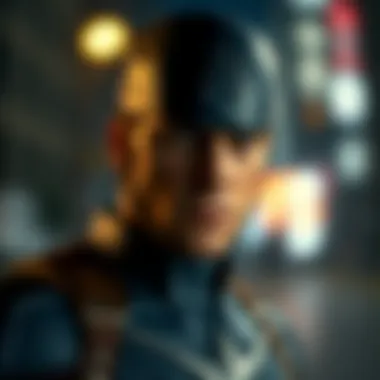Captain America: Exploring Marvel's Symbol of Leadership


Intro
Captain America remains one of the most enduring figures within the Marvel Universe, embodying the struggles and triumphs of heroism. First introduced in the early 1940s, he has developed from a simple soldier fighting World War II into a multifaceted symbol of resilience, moral compass, and leadership. In various narratives, he not only engages in epic battles against formidable foes but also challenges the ethical dilemmas of his time, reflecting societal changes and audience expectations.
In the realm of gaming, Captain America's character enriches the experience through his unique abilities and traits, influencing gameplay mechanics these days. His presence in titles like Marvel's Avengers and others has breathed new life into the superhero genre, inviting players to explore his ideals and decision-making processes. This article takes a closer look at how Captain America serves as a beacon of integrity and heroism, both in storytelling and player engagement. Through a comprehensive examination, we will delve into his character development, impact on narratives, and gameplay integration, showcasing the complexities and triumphs of the character.
Captain America: Symbol of an Era
Captain America is more than just a superhero; he represents a cultural icon whose significance stretches beyond comic books and into the very fabric of society. This section emphasizes his status as a symbol of resilience and leadership, particularly during turbulent times in history. As we explore the dual facets of his character—from his origins rooted in patriotism to his role as a moral beacon—it's essential to understand how these elements resonate with both fans and critics alike.
Origins and Historical Context
Captain America made his debut during a time when the world was engulfed in the chaos of World War II. Created by Joe Simon and Jack Kirby in 1941, his origins speak to the sentiments of a nation trying to rally against tyranny and oppression. The character was conceived as a soldier for the American cause, wielding his iconic shield not just as a weapon but as a representation of hope and courage.
When he was introduced, the United States faced dark days, and Captain America quickly became a source of inspiration. He was not simply a fictional character; he embodied the values many Americans aspired to: bravery, sacrifice, and the unwavering belief in justice. His origins can be seen as a reaction to global events, echoing the call of many who sought a hero to stand against the forces of evil.
This brings us to the greater historical context of comic books during that era. Superheroes were fanciful escapism, yet they reflected pressing social issues, providing a mirror to society’s attitudes and desires. Captain America, through his battles on paper, offered a sense of agency and control in an unpredictable world.
Cultural Impact and Significance
Captain America's cultural impact extends far beyond his comic book pages. His persona has evolved to address contemporary issues, symbolizing a beacon of integrity, valiance, and moral clarity in an increasingly complex society. From the 1940s to today, he has not only retained his popularity but has also sparked conversations around citizenship, duty, and what it means to be a hero.
The character's significance can be categorized into several key areas:
- Portrayal of National Identity: Captain America reflects the struggles and triumphs of America itself. His journeys through various story arcs often parallel real-world scenarios, touching upon themes of national pride and the critique of governmental actions.
- Representation of Values: Captain America stands for ideals that resonate across generations. Themes of justice, sacrifice, and the fight against tyranny make him a relevant figure, encouraging discussions about ethics in leadership and the moral dilemmas faced by those in power.
- Influence on Media: The character's transition from comics to films depicts how stories evolve with the times, adapting to modern concerns. The success of films like The First Avenger and Captain America: The Winter Soldier highlight his relevance in today’s cinema, keeping his ideals alive while reaching new audiences.
- Cross-Generational Appeal: His role has been embraced widely, from children reading comics to adults analyzing the deeper themes in his narratives. The way he is presented and received often showcases societal shifts, acting as a touchstone for discussions surrounding heroism.
As we delve deeper into Captain America’s character development in comics, it is essential to appreciate how his rich heritage and cultural backdrop continue to shape not just the figure he represents, but also the very ethos of what it means to be a hero in today's world.
"Captain America isn’t just a hero for America, he stands for values that can uplift us all. He’s a reminder that we can all choose to act justly, even when it’s tough."
For further reading on the evolution of Captain America and his cultural impact, consider checking out detailed analyses available at Wikipedia and Britannica to enhance your understanding.
Character Development in Comics
Understanding Captain America's character development gives us deeper insights into what makes him resonate not just as a superhero but as a symbol of persistence and moral integrity. His journey reflects the evolution of society, paralleling the tumultuous historical contexts that have shaped the narratives around him. Each story is a building block, crafting a more complex and human character who embodies values many aspire to in the real world.
Powers and Abilities
Captain America is not just your average hero equipped with gadgets or superhuman strength. His abilities are deeply rooted in the narrative, reflecting the essence of what it means to be a leader. Enhanced by the Super Soldier Serum originally designed during World War II, his physical capabilities are beyond human limits—strength, agility, and endurance elevate him above many others. However, it's his strategic mind and unshakeable courage that truly sets him apart.
His iconic shield isn't merely a tool for combat; it's a metaphor for his philosophy. It symbolizes defense, resilience, and the idea of standing firm against adversity. Using it in gameplay, players can not only reflect his physical prowess but also embrace the tactical aspect he embodies.
Moral Compass: The Ethical Dimensions
Captain America’s narrative is intertwined with ethical dilemmas that challenge his ideals. His moral compass is unwavering, serving as a standard against which right and wrong are measured. This reliability is especially impactful in situations that require not just strength but a profound sense of duty and sacrifice.
In comics, Captain America often grapples with the consequences of these choices—should he uphold government orders even when they contradict his values? This tension shapes his story arcs significantly, illustrating how he navigates complex societal issues. This is crucial when examining his role as a pivotal figure not just in his own adventures, but across the broader Marvel Universe as well.
Significant Story Arcs
Winter Soldier


In "Winter Soldier", we see Captain America face perhaps one of his largest personal challenges: loyalty and betrayal. Facing off against his old friend Bucky Barnes, who has been transformed into the Winter Soldier, the arc encapsulates not just a physical confrontation but an emotional one. By dealing with themes of loss and redemption, it elevates the stakes. The portrayal of Bucky adds a layer to Steve Rogers’ character; he is not just fighting against an enemy, but also struggling with his memories and friends. This complexity makes it a beneficial choice to highlight in this article due to its emotional depth. It encourages readers and players alike to confront their own feelings about loyalty and responsibility.
Secret Wars
Secret Wars redefines the scope of reality and consequence in Captain America's narrative. The storyline casts heroes in a host of moral questions and conflicts, creating a scenario where alliances are tested, including Captain America's own. This arc lacks a clear villain, instead presenting shades of grey that resonate with the complexities of real-world politics and morality. It's popular within this discussion since it emphasizes collaboration, tactics, and the inevitability of making hard choices. Its unique feature lies in its multi-dimensional characters, each facing their own version of justice and moral decisions, illuminating Captain America’s ethos in the process.
Civil War
The "Civil War" arc dives deep into the dichotomy of freedom versus security. Captain America stands against the Superhuman Registration Act, believing in personal liberty, while Iron Man champions governmental oversight. This dichotomy is illustrative of broader societal issues and sparks debates around authority, responsibility, and personal freedom. This makes it a highly relevant arc for the article as it not only illustrates internal conflict for Captain America but also reflects the current zeitgeist regarding civil liberties. Moreover, the narrative introduces significant personal stakes that challenge Captain America’s ideals, making it a prime example of ethical quandaries in storytelling.
"Captain America's story isn't just about fighting bad guys; it's about wrestling with the very essence of what it means to be good."
Captain America in the Cinematic Universe
The journey of Captain America from comic book pages to the silver screen marks a significant evolution in storytelling within the Marvel Universe. These adaptations are not simply translations; they add depth and nuance reflecting changing societal values and audience expectations. Captain America thrives in this space, embodying ideals of heroism and sacrifice while also grappling with dilemmas that resonate with viewers.
Transformation from Page to Screen
When Captain America made the leap from comic book to film, a plethora of challenges emerged. Translating his iconic shield and patriotism into a cinematic experience required a careful balance between staying true to the source material and making it engaging for new audiences. Studios crafted narratives that not only showcased his physical prowess but also delved into his psychological facets. This transformation indicates more than just a superhero's journey; it showcases the cultural zeitgeist through the lens of a character deeply rooted in American history.
Influential Films and Narratives
The First Avenger
The First Avenger serves as a foundational film not just for Captain America, but for the Marvel Cinematic Universe as a whole. It dives into Steve Rogers' origins, painting a vivid picture of a frail young man longing to serve his country. This classic tale of the underdog resonates because it reflects the very human desire for recognition and purpose. The film’s key characteristic is its historical context, setting in WWII, which serves as a backdrop for themes of courage, sacrifice, and the moral ambiguities of war.
The unique feature here is the way the film juxtaposes the hero’s physical transformation with the war's brutality, exposing the grim realities beneath the surface of heroism. It sets the stage for Captain America's ethical dilemmas in future narratives, making it a valuable piece for understanding his character arc within the broader Marvel landscape.
The Winter Soldier
The Winter Soldier takes a different approach, shifting the focus to themes of trust and government oversight. It is an essential narrative as it challenges Captain America's ideals against a backdrop of espionage and conspiracy. The moral complexities are significant, as Steve navigates a world where loyalties are tested and the line between heroism and villainy blurs.
This film highlights Captain America's adaptability—he must reconcile his values with the present-day landscape, showcasing his growth as a leader. The thrilling action sequences amplify the tension, keeping audiences engaged while rooting for a character entrenched in a battle of ideals. Its influence is profound as it sheds light on Captain America's reactions to his evolving world, making it a must-watch in understanding his character.
Endgame
Endgame is an emotional culmination that reflects Captain America's unwavering resolve amidst loss and sacrifice. This film not only marks a pivotal point in the timeline of the Marvel Universe but also in Captain America's personal journey. Here, key characteristics revolve around leadership and resilience, as he takes on a role that emphasizes the importance of teamwork and unity in adversity.
The unique feature of Endgame lies in its exploration of legacy. It asks pressing questions about identity and duty, urging viewers to ponder what it means to be a hero. Captain America’s journey in this film resonates deeply with the audience, as it lays bare the emotional heft of his sacrifices throughout the franchise. By addressing themes of aging and the passing of the torch, it carefully constructs a powerful narrative arc, solidifying his place in the hearts of fans.
"A hero is only as good as the story he embodies, and Captain America’s story has evolved beautifully across the cinematic landscape."
These films demonstrate the broader significance of Captain America in the cinematic universe, as he serves not merely as a superhero, but a cultural touchstone reflecting the values and challenges of respective eras.
The Legacy of Captain America
Captain America has become a cultural touchstone, resonating through generations as a figure embodying the ideals of heroism, valor, and moral integrity. His legacy goes beyond the pages of comic books and film screens, influencing various facets of pop culture, gaming, and character development. The importance of this legacy lies not just in the character himself but also in the ethos he represents, making him a pivotal figure in the ever-expanding Marvel Universe. Understanding Captain America’s legacy helps us appreciate how he shapes narrative arcs, character relationships, and player engagement in gaming.
Influence on Future Characters
Captain America serves as a template for numerous heroes in Marvel Comics and beyond. His ideals and struggles have inspired many characters to develop a strong moral compass, often reflecting the conflicts between personal beliefs and collective responsibility. For instance, characters like Sam Wilson—who eventually takes on the mantle of Captain America—exhibit traits drawn directly from Steve Rogers’ characteristics: bravery in the face of adversity and unwavering loyalty to friends and allies.
- Heroic Tropes: Heroes who sacrifice for the greater good often stem from Captain America’s archetype. Tony Stark, for example, aligns with this theme, especially in his nuanced growth toward altruism.
- Conflict and Resolution: Many narratives examine how heroism is oftentimes intertwined with ethical dilemmas, mirroring the Civil War arc that pits friends against each other. This exploration informs newer characters, making their conflicts more relatable and profound.


As we see writers expand the universe, elements that stem from the Captain America ethos continue molding the next generation of heroes. This lasting influence shapes reader expectations and defines the spectrum of heroism in broad strokes.
Fan Response and Adaptations
Fan engagement with Captain America has evolved, echoing his adaptability to societal changes and cultural trends. The character’s journey through the various media—comics, films, and games—mirrors shifting public sentiments, enabling him to resonate deeply with audiences. Fans have reacted in a myriad of ways, illustrating Captain America’s multifaceted nature:
- Comic Book Evolution: As society grapples with issues like inequality and justice, comic adaptations have taken Captain America on paths that reflect contemporary concerns. This adaptability has kept him relevant across generations.
- Movies and Gaming: Films like "The Winter Soldier" have drawn acclaim for their exploration of surveillance and government overreach, connecting Captain America to modern convergences on freedom and privacy. Fans often see these adaptations as necessary reimaginations that sustain the character's relevance.
Fans also contribute directly to character expansion through extensive discussions and fan-created content across platforms like Reddit and Facebook, showcasing their passion and interpretations of Captain America's legacy. The character remains a focal point in discussions surrounding heroism in popular culture, from fan art to essays dissecting his impact.
"Captain America is more than just a hero. He’s an embodiment of principles that can and should be examined through time."
In summary, Captain America’s legacy not only shapes future characters but continually engages fans in meaningful dialogues. His moral complexities and adherence to principles create a rich terrain for exploring heroism, making him a lasting figure in both narratives and society at large. As we move forward, his presence in gaming and media only suggests that Captain America will remain a formidable icon in pop culture.
Captain America as a Game Character
Captain America has made a substantial mark not just in comics and films but also in the realm of video games. As a game character, his significance stems from his embodiment of heroism, leadership, and the moral dilemmas that embody the essence of the character. Players who engage with Captain America in games like Marvel Champions not only confront thrilling gameplay mechanics but also contemplate the ethical dimensions of their choices.
Prologue to Marvel Champions
Marvel Champions: The Card Game offers players an immersive experience that blends strategy with the rich narrative backdrop of the Marvel universe. This game stands out for its emphasis on cooperative play, where characters, including Captain America, can work together to confront various threats. Players can collect cards representing their heroes, enhancing the gameplay through unique abilities and tactical maneuvers. Captain America’s introduction into this setting adds a layer of complexity, as his character is woven into the fabric of gameplay through his strategic skills and moral integrity.
Gameplay Mechanics and Strategy
Understanding the gameplay mechanics is crucial for players aiming to maximize their effectiveness in Marvel Champions. Captain America, with his tactical prowess, serves as an excellent anchor for team strategies. Below are some key aspects to consider:
Character Classes
Character classes in Marvel Champions categorize heroes into distinct roles, each bringing unique advantages to the table. Captain America falls under the Hero class, inherently designed for direct confrontation and leadership.
- Key Feature: His ability to inspire teammates enhances their performance, making him a favorite pick for cooperative play.
- Advantages: This class enables players to utilize Captain America’s leadership for team synergy, boosting attacks and defenses of allies.
- Disadvantages: While strong offensively, he can sometimes be overwhelmed if not properly shielded by allies, requiring players to be strategic about positioning and use of abilities.
Abilities and Skills
Captain America's abilities are a mix of combat techniques and tactical skills that resonate with his comic persona. His iconic shield not only serves as a weapon but also as a defensive tool.
- Key Characteristic: The shield toss ability allows him to deal damage to multiple enemies simultaneously.
- Advantages: This multi-target capability can turn the tide in challenging scenarios by spreading damage effectively across foes.
- Disadvantages: However, reliance on this ability requires proper timing and can leave him vulnerable if overused without backup from team members.
Team Synergy
Team synergy is pivotal in Marvel Champions, and Captain America exemplifies this. His gameplay revolves around encouraging cooperation and maximizing the strengths of his allies.
- Key Characteristic: His leadership ability not only supports his attacks but also provides buffs to teammates, making it easier to overcome formidable adversaries.
- Benefits: This synergy fosters a cohesive unit, where players can devise strategies to best exploit enemy weaknesses.
- Drawbacks: The success of team synergy hinges on the players’ communication and understanding of each character’s roles, which can lead to issues if not coordinated effectively.
"In Marvel Champions, Captain America exemplifies what it means to lead a team through chaos. His powers highlight the importance of cooperation."
In wrapping up this section, Captain America is more than just a game character; he symbolizes a call to action for players to think critically about their choices, strategies, and teamwork. Through engaging gameplay mechanics and character attributes, he enriches the overall experience, encouraging players to embody the values he represents.
Thematic Exploration in Gameplay
Understanding Thematic Exploration in Gameplay serves as the backbone for delving deeper into Captain America’s character, particularly in the Marvel Champions context. This aspect not only accentuates the hero's attributes but also intersects with player engagement, making gameplay richer and more meaningful. Exploring themes such as leadership and moral choice can resonate with players, guiding their decision-making processes and strategic approaches.


Leadership Role in Combat
In the world of Marvel Champions, Captain America embodies the role of a leader both in lore and in gameplay. His ability to inspire and unite is not just a narrative device but a core mechanic that enhances play dynamics. Players leveraging Captain America's leadership must navigate various scenarios where tactical decision-making and collaborative strategies come to the forefront.
When fighting alongside other heroes, Captain America has unique abilities that promote team synergy. He can raise morale, boost allies' defenses, or even redirect threats, embodying the essence of collective strength. This approach encourages gamers to think beyond individual prowess, fostering an atmosphere of teamwork. Simple yet profound, his leadership exemplifies how working together can yield greater outcomes, teaching important lessons not only in-game but also reflecting themes of cooperation applicable in life.
Captain America’s Tactical Vision moves beyond mere character skills. It introduces concepts where every decision affects the team's success or failure. This paradigm shift illustrates how players must consider their actions not in isolation but as part of a complex puzzle. A mere misstep could unravel a well-crafted strategy—a realisation that stimulates engagement and critical thinking among players.
Moral Decisions in Game Mechanics
Another pivotal aspect of Captain America’s gameplay is the incorporation of moral decision-making within game mechanics. These elements challenge players to consider the ramifications of their choices amidst combat scenarios, resonating deeply with Captain America's own ethical compass. Gameplay situations that call for moral judgement elevate the experience, creating spaces where players are not just fighting enemies but grappling with the consequences of their actions.
For example, players may face scenarios where they must choose between a strategy that maximizes damage or one that protects a weaker ally. This not only tests combat skills but also prompts introspection on one’s values. The choices resonate with Captain America’s legacy — his consistent struggle to do right in morally ambiguous situations.
"In battle, there is always choice. The right path isn't always the easiest one."
These moral quandaries enhance engagement, prompting thoughtful decision-making that can lead to varied outcomes and replayability. Knowledge of Captain America’s backstory alongside understanding game mechanics helps explain why certain decisions yield specific results.
Overall, Thematic Exploration in Gameplay through Captain America’s lens brings forth layers of leadership and morality, enhancing player experience. Gamers are invited to align their strategies with values that Captain America represents, tying together gameplay and character development into a cohesive experience that challenges and entertains.
Cross-overs and Collaborations
Cross-overs and collaborations are essential elements in the Marvel Universe, driving deeper narratives and expanding character relationships. They allow for interactions between characters that would not ordinarily cross paths, providing fertile ground for dynamic storytelling. For Captain America, these cross-overs not only showcase his leadership and moral integrity but also highlight his adaptability and ability to unite diverse factions under a common cause.
Interaction with Other Marvel Characters
Captain America frequently teams up with a range of Marvel characters, from fellow Avengers like Iron Man and Thor to other heroes outside his usual circles, such as Spider-Man and Black Panther. This interaction fosters an interwoven narrative, emphasizing complimentary abilities and perspectives.
- Strengthening Alliances: When characters like Black Widow or Falcon collaborate with Captain America, the blend of their unique skills often results in a more effective approach to combat. These collaborations resonate with themes of unity and friendship, which are central to the Captain America's character arc.
- Diverse Perspectives: With characters like Doctor Strange or the Guardians of the Galaxy, the dialogue and dynamics can shift dramatically. Captain America's grounded nature contrasts sharply with the more flamboyant or mystical elements they bring. Such contrasts help to explore complex themes, such as the clash between tradition and innovation in superhero narratives.
- Conflict and Resolution: In instances where Captain America's values are challenged, such as during his interactions with characters like Wolverine or Deadpool, the narratives often unfold to reveal deeper ethical dilemmas. His steadfast commitment to his beliefs often brings a moral compass to chaotic situations, forcing other characters—and the audience—to confront their own values.
"The best partnerships emerge not from agreement, but from the clash of ideas and concepts."
Captain America's Role in Larger Marvel Events
During major Marvel events, Captain America emerges not just as a warrior, but also as a symbol of hope and resilience. His involvement in plotlines such as the Infinity War and Secret Invasion underlines his significance in the overarching Marvel mythos.
- Moral Leadership: In events like Civil War, his role becomes critical in navigating the complexities of superhero ethics. His insistence on doing what is right often puts him at odds with other heroes, serving as a catalyst for discussions on freedom, responsibility, and governance.
- Battlefield Strategy: In cross-over events, Captain America's strategies often dictate the outcome of battles. His tactical brilliance is showcased as he assembles teams to confront larger threats, demonstrating the importance of collaboration among heroes.
- Unifying Force: When conflicts arise among heroes, Captain America consistently plays a pivotal role in re-establishing unity. His interactions deepen character relationships and demonstrate how collective strength often triumphs over individual might.
These cross-overs and collaborations not only enhance the narrative depth of Captain America but also encourage engaging gameplay dynamics in gaming adaptations. His ability to adapt, lead, and unite makes him a quintessential character who embodies the spirit of collaboration throughout the sprawling Marvel Universe.
End: The Enduring Legacy
The legacy of Captain America not only serves as a touchstone in the realm of superhero narratives but also resonates deeply with the ongoing evolution of societal values and ethics. This final section emphasizes the enduring significance of Captain America, reflecting on how he mirrors cultural shifts and outcomes of various conflicts, both fictional and genuine. As a character molded from principles of justice and righteousness, he embodies the timeless struggle for freedom and equity. Through the lens of modern storytelling, we assess his relevance in today’s society and the gaming landscape.
Captain America's Relevance in Modern Times
In a world increasingly defined by its complexities, Captain America remains a compelling symbol. His character, often seen as a paragon of virtue, grapples with moral dilemmas that echo contemporary issues. For example, his role in narratives can be seen as a commentary on patriotism versus personal ethics. This dynamic plays out critically in story arcs such as Civil War, where he asserts that a hero's mission should never be dictated by authority, reflecting modern sentiments towards authority figures and government actions.
- Resonance with Current Issues: Just as Captain America faced the tyrannies of his time, present-day audiences can relate to his struggles against modern societal challenges, revealing how heroism transcends the years.
- Diverse Interpretations: Varied adaptations in films and comics capture his evolution, showing how creators adapt his symbolism to match contemporary values. He morphs from a wartime icon to a figure searching for truth in a murky moral landscape.
- Symbolic Representation: In many ways, Captain America acts as a mirror, reflecting our own aspirations and ethical conflicts. The ideals he encourages—integrity, courage, and resilience—remain essential in current conversations involving justice and equity.
“The true measure of a superhero is not their powers, but their commitment to ideals and the strength to question them.”
Future of Captain America in Gaming and Media
As we pivot towards Captain America's future in gaming and media, anticipation swells around potential developments. The character has already established himself within the interactive spaces of the Marvel Universe, notably in Marvel’s Avengers and Marvel Champions. These platforms have expanded his narrative while allowing gamers to interact with his value sets in unique ways. The future possibilities are both exciting and challenging.
- Evolving Game Mechanics: Future games are likely to incorporate more intricate decision-making scenarios that reflect his complicated moral compass. Gamers could soon find themselves not just fighting battles but also navigating the ethical implications of their choices, mirroring Captain America's journey.
- Expanding Narratives: Leveraging platforms like streaming services and mobile games could allow for even deeper storytelling. Players might experience Captain America in new formats that blend traditional narratives with open-world elements, heightening player engagement and emotional investment.
- Community Involvement: As gaming continues to emphasize community and collaboration, there's room for Captain America to inspire teamwork. Future titles might allow for cooperative gameplay styles that engage players in Captain America's ideal of shared responsibility, further solidifying his legacy in modern media.
Captain America stands as more than a fictional character; he’s a beacon of moral integrity and collective action. His relevance stretches far beyond the pages of comics and screens, binding us with lessons of endurance and valor, influencing both players and moviegoers alike. As stories evolve, Captain America's spirit remains, ensuring that the legacy of this iconic figure endures through new generations of fans and players.



